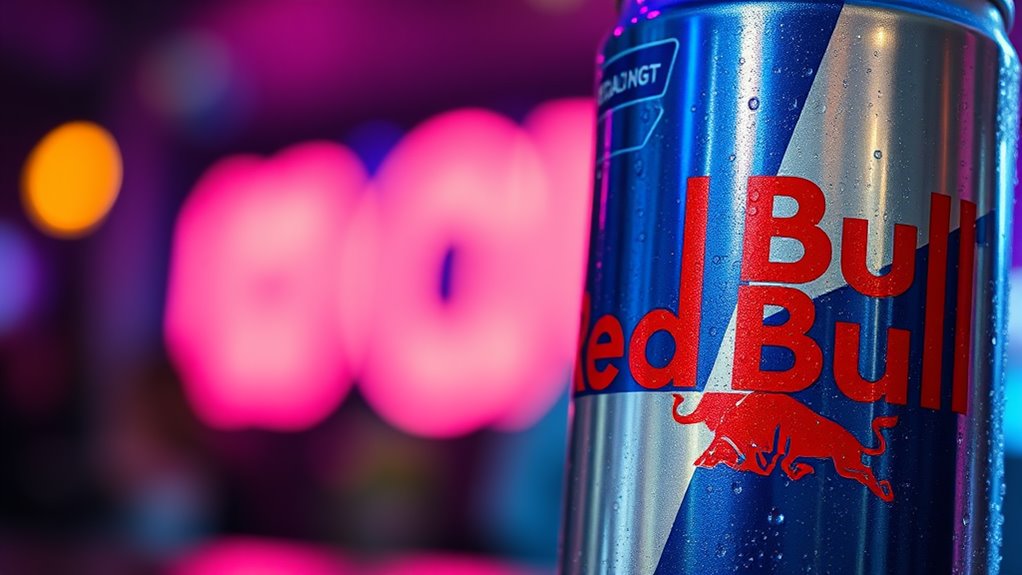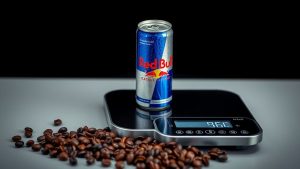
Red Bull's caffeine content varies by can size. An 8.4 oz can contains about 80 mg of caffeine, while a 12 oz can has around 114 mg. If you opt for a 16 oz can, you'll get roughly 160 mg of caffeine. Notably, the sugar-free version has the same caffeine levels as the regular ones. Be mindful of your total caffeine intake, as it can impact your health. Explore more to see how it compares to other popular beverages.
Have you ever wondered how much caffeine is actually in a can of Red Bull? If you're reaching for an 8.4 oz can, you'll find it contains approximately 80 mg of caffeine. This caffeine content is comparable to what you'd get from a small cup of coffee. For those who prefer larger servings, a 12 oz can of Red Bull packs about 114 mg of caffeine, while a 16 oz can boosts that number to roughly 160 mg. Notably, if you opt for a sugar-free version, the caffeine content remains unchanged at 80 mg per 8.4 oz can. The 16 oz Sugar-Free Red Bull contains 160 mg of caffeine, same as regular version.
An 8.4 oz can of Red Bull contains approximately 80 mg of caffeine, similar to a small cup of coffee.
When you compare Red Bull to other energy drinks, the differences in caffeine levels become clearer. For instance, a 16 oz can of Monster Energy contains around 166 mg of caffeine, much more than Red Bull's equivalent size. It's crucial to recognize that caffeine levels in coffee can also vary widely based on brewing method and the type of beans used. Typically, a standard cup of coffee contains anywhere from 70 mg to 140 mg of caffeine. So, if you're trying to gauge your caffeine intake, Red Bull's content is fairly consistent and predictable.
Another aspect to evaluate is the interaction between caffeine and taurine, a key ingredient in Red Bull. While taurine is believed to enhance the effects of caffeine, it's vital to be mindful of your body's response to both. Individual caffeine sensitivity varies due to genetic factors and metabolism, meaning that some people may experience jitters or anxiety even at lower doses. If you're prone to these side effects, it's wise to monitor your caffeine consumption closely, especially with energy drinks.
The recommended daily caffeine limit for most adults hovers around 400 mg. This means that consuming multiple cans of Red Bull in a day could lead you close to or over this limit, potentially resulting in negative side effects like increased heart rate or sleep disturbances. It's worth mentioning that pregnant women and children should have even stricter limits on their caffeine intake.
Red Bull comes in various sizes and flavors, but the caffeine content remains stable across its standard offerings. Each size provides a different caffeine level, yet the sugar-free alternatives maintain the same caffeine concentration.
However, you should also be aware of the sugar content in regular Red Bull. An 8.4 oz can contains about 27 grams of sugar, which raises concerns for those monitoring their dietary sugar intake.
Conclusion
To sum up, when you crack open a can of Red Bull, you're sipping on about 80 milligrams of caffeine—enough to give you a jolt like a lightning strike on a summer night. This amount, while moderate, can fuel your focus and energy, but it's wise to keep an eye on your overall intake. Like balancing on a tightrope, finding that sweet spot between alertness and jitteriness is key to harnessing the power of caffeine without tipping over.



